Location
Biomedical Sciences Research Bldg, Rm 4318
109 Zina Pitcher Pl
Ann Arbor, MI 48109
Phone
(734) 615-2207
Research Interests
Our research interests focus on the development of nanoparticles for use as adjuvants in prophylactic and therapeutic vaccines and as tools for studying the key biological pathways leading to the induction of protective immunity. In particular, we are developing emulsion based adjuvants to drive more robust, durable, and broadly protective immunity towards the influenza virus and SARS-CoV-2. Current influenza virus vaccines offer suboptimal protection due to their low immunogenicity, particularly in immunocompromised populations, and to the limited cross-subtype protection they confer. The size and physicochemical properties of emulsion based adjuvants mimic several of the characteristics of viral and bacterial pathogens, allowing them to more effectively activate the immune pathways involved in natural infection as compared to traditional adjuvants. Similarly, we are developing combined adjuvants for intranasal vaccines to improve the induction of more tailored and robust mucosal immune responses towards respiratory viruses including influenza and SARS-CoV-2. Lastly, using these adjuvants, we are also studying how they can be harnessed to redirect the immune system in other disease models.
Another focus of our laboratory is the development of dendrimer based nanoparticles for applications such as targeted and controlled delivery of drugs for antibacterial and anticancer therapeutics and for the specific labeling of diseased cells for imaging and diagnostic applications. Our work employs a multidisciplinary approach, combining tools from biochemistry, biophysics, and immunology.
Research Areas:
Bio-Micro Nanotechnology and Molecular Engineering, Bio-Nanotechnology, Biomaterials, Drug Delivery and Therapeutics, Tissue Engineering and Biomaterials
Additional Title(s)
- Michigan Nanotechnology Institute for Medicine and Biological Sciences, Mary H. Weiser Food Allergy Center
